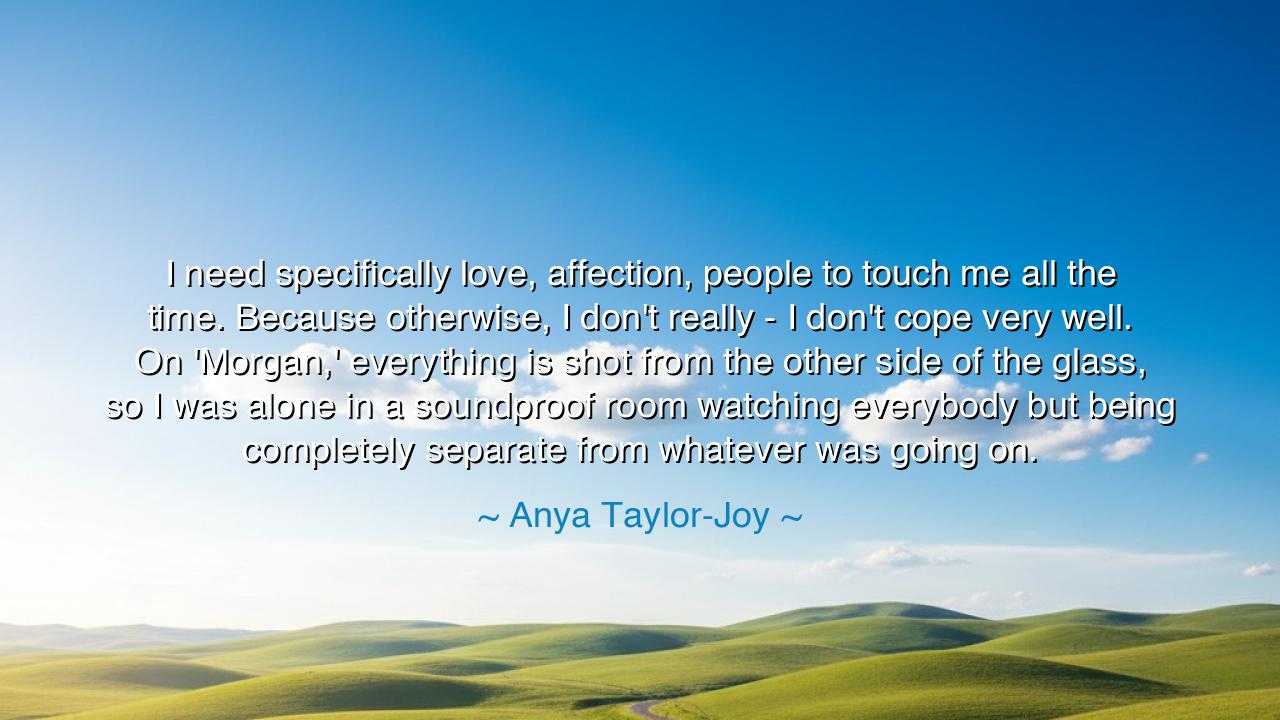
I need specifically love, affection, people to touch me all the
I need specifically love, affection, people to touch me all the time. Because otherwise, I don't really - I don't cope very well. On 'Morgan,' everything is shot from the other side of the glass, so I was alone in a soundproof room watching everybody but being completely separate from whatever was going on.






In the tender and haunting confession of Anya Taylor-Joy, we hear the voice of a soul both luminous and human: “I need specifically love, affection, people to touch me all the time. Because otherwise, I don’t really — I don’t cope very well. On ‘Morgan,’ everything is shot from the other side of the glass, so I was alone in a soundproof room watching everybody but being completely separate from whatever was going on.” Within these words lies not the weakness of dependency, but the ancient longing that has lived in every human heart — the longing for connection, for touch, for the warmth of being known and held in a world that so easily drifts toward isolation.
The origin of this truth comes from the nature of the film Morgan, in which Taylor-Joy played a being both human and not — a creation of science who exists apart from the world that made her. Yet in her reflection, she speaks not as a character, but as a person, unveiling a universal ache. She tells us that even when surrounded by people, even when her image and voice fill the screen, the absence of human touch — the small gestures of love and presence — can turn life into a kind of soundproof room. To see others and not be able to feel them is to experience the most exquisite and terrible form of loneliness.
The ancients would have recognized this sorrow. The philosopher Aristotle called man a “social animal,” meaning not merely that he speaks or lives among others, but that he needs others to become whole. The poet Sappho wrote of love as both wound and medicine, for in its absence the spirit withers. Even the hermits and sages, who withdrew from the world, sought the divine touch in place of the human one. To live untouched — whether by hand, word, or compassion — is to live half-alive. For the soul, like the body, hungers for contact, for the assurance that it belongs to something greater than itself.
Anya’s image of the glass wall is more than a description of her work — it is a mirror of the modern condition. How many today live behind invisible walls, connected by screens yet untouched in spirit? How many speak without truly being heard, look without truly seeing, or perform without ever being known? The soundproof room of her film becomes a symbol of our age — we can see the world, we can even shout to it, yet our hearts remain unheard. The tragedy of this isolation is not that we are alone, but that we are near others and still unseen.
Consider the life of Emily Dickinson, who dwelt in solitude yet filled the world with her words. Her poetry, so intimate and alive, was her way of reaching through the glass — of touching humanity from behind the walls she built. Though she rarely saw another face, her longing for connection poured into every line she wrote. Like Taylor-Joy, she understood that the body may be isolated, but the soul still stretches its hands outward, seeking warmth. And when that touch is returned — even through art, kindness, or understanding — life blossoms again.
From Taylor-Joy’s reflection, we learn a sacred truth: that love and affection are not luxuries, but necessities of the soul. Just as plants lean toward sunlight, so too do we lean toward tenderness. To be touched — by a hand, by a word, by a presence — affirms that we exist, that we matter, that we are part of the great fabric of life. Without it, even fame, art, and achievement lose their meaning. To touch others and to allow ourselves to be touched is the first language of humanity — older than speech, deeper than reason.
Therefore, my child, take this teaching to heart: do not withhold touch, affection, or kindness from those who cross your path. For even the smallest act of warmth can heal a heart behind glass. Seek the company of those who nourish your spirit, and do not fear to speak your need for closeness. When you see another trapped in silence or solitude, be the one who reaches through — for the hand that touches another’s sorrow also redeems its own.
And so, let Anya Taylor-Joy’s words remind you of what it means to be fully human. You may have all the light of the world upon you, yet without connection, it is only a reflection, not warmth. Break the glass. Step beyond the soundproof room. Touch and be touched — for in that sacred exchange, life begins again.






AAdministratorAdministrator
Welcome, honored guests. Please leave a comment, we will respond soon